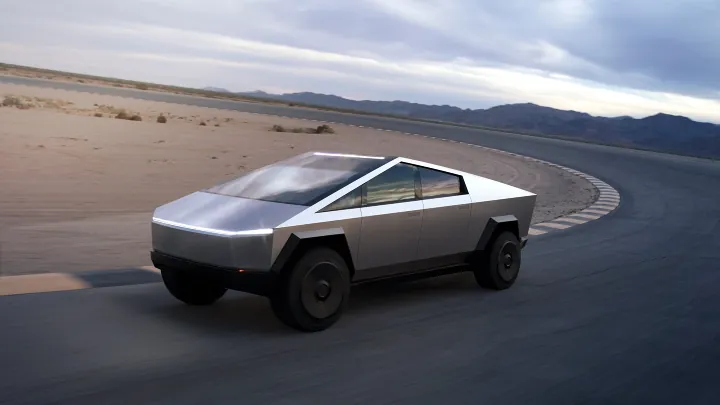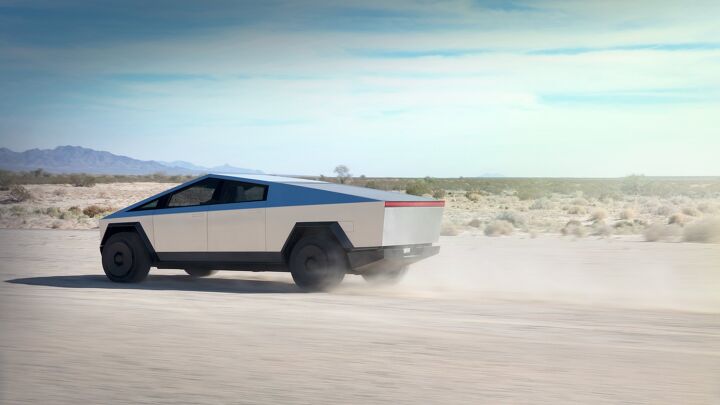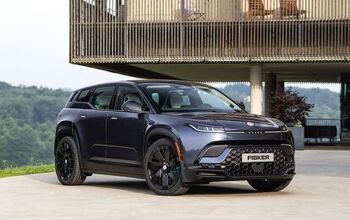Tesla Starts Offering Cheaper Cybertruck Variant to Reservation Holders

It took Tesla a few years to get the Cybertruck out the door, but when it did, the long-promised affordable models weren’t part of the deal. That’s changing, though only slightly, as the automaker has opened the order books for a more “affordable” Cybertruck variant starting at around $80,000.
Looking at Tesla’s Cybertruck configuration site, only the most expensive trims appear, but current reservation holders have started receiving emails with invitations to order the lesser, non-Foundation model trim. The automaker expects deliveries to comments in the next few weeks, so the wait is much shorter than it was for early orders. As a note, the roughly $80,000 price is for the non-Foundation AWD models.
The reduced starting price could make the truck eligible for the $7,500 federal EV tax credit, but reservation holders did not see any note of such a benefit in the emails. We don’t know if the truck would qualify for the credits, though, because Tesla hasn’t detailed where the batteries come from and doesn’t have a PR department to ask.
Tesla initially promised prices that started at under $40,000, but they have hovered at more than twice that number since the truck’s molasses-speed rollout. The Cybertruck has also been wrapped up in recalls, and there’s no shortage of disappointed owners on the internet, crowing about trim pieces falling out, the frame crinkling during towing, and more.
[Images: Tesla]
Become a TTAC insider. Get the latest news, features, TTAC takes, and everything else that gets to the truth about cars first by subscribing to our newsletter.

Chris grew up in, under, and around cars, but took the long way around to becoming an automotive writer. After a career in technology consulting and a trip through business school, Chris began writing about the automotive industry as a way to reconnect with his passion and get behind the wheel of a new car every week. He focuses on taking complex industry stories and making them digestible by any reader. Just don’t expect him to stay away from high-mileage Porsches.
More by Chris Teague
Latest Car Reviews
Read moreLatest Product Reviews
Read moreRecent Comments
- EBFlex Garbage but for less!
- FreedMike I actually had a deal in place for a PHEV - a Mazda CX-90 - but it turned out to be too big to fit comfortably in my garage, thus making too difficult to charge, so I passed. But from that, I learned the Truth About PHEVs - they're a VERY niche product, and probably always be, because their use case is rather nebulous. Yes, you can run on EV power for 25-30 miles, plug it in at home on a slow charger, and the next day, you're ready to go again. Great in theory, but in practice, a) you still need a home charger, b) you paid a LOT more for the car than you would have for a standard hybrid, and c) you discover the nasty secret of PHEVs, which is that when they're on battery power, they're absolute pigs to drive. Meanwhile, to maintain its' piglike battery-only performance, it still needs to be charged, so you're running into all the (overstated) challenges that BEV owners have, with none of the performance that BEV owners like. To quote King George in "Hamilton": " Awesome. Wow." In the Mazda's case, the PHEV tech was used as a performance enhancer - which worked VERY nicely - but it's the only performance-oriented PHEV out there that doesn't have a Mercedes-level pricetag. So who's the ideal owner here? Far as I can tell, it's someone who doesn't mind doing his 25 mile daily commute in a car that's slow as f*ck, but also wants to take the car on long road trips that would be inconvenient in a BEV. Meanwhile, the MPG Uber Alles buyers are VERY cost conscious - thus the MPG Uber Alles thing - and won't be enthusiastic about spending thousands more to get similar mileage to a standard hybrid. That's why the Volt failed. The tech is great for a narrow slice of buyers, but I think the real star of the PHEV revival show is the same tax credits that many BEVs get.
- RHD The speed limit was raised from 62.1 MPH to 68.3 MPH. It's a slight difference which will, more than anything, lower the fines for the guy caught going 140 KPH.
- Msquare The argument for unlimited autobahns has historically been that lane discipline is a life-or-death thing instead of a suggestion. That and marketing cars designed for autobahn speeds gives German automakers an advantage even in places where you can't hope to reach such speeds. Not just because of enforcement, but because of road conditions. An old Honda commercial voiced by Burgess Meredith had an Accord going 110 mph. Burgess said, "At 110 miles per hour, we have found the Accord to be quiet and comfortable. At half that speed, you may find it to be twice as quiet and comfortable." That has sold Mercedes, BMW's and even Volkswagens for decades. The Green Party has been pushing for decades for a 100 km/h blanket limit for environmental reasons, with zero success.
- Varezhka The upcoming mild-hybrid version (aka 500 Ibrida) can't come soon enough. Since the new 500e is based on the old Alfa Mito and Opel Adam platform (now renamed STLA City) you'd have thought they've developed the gas version together.




































Comments
Join the conversation